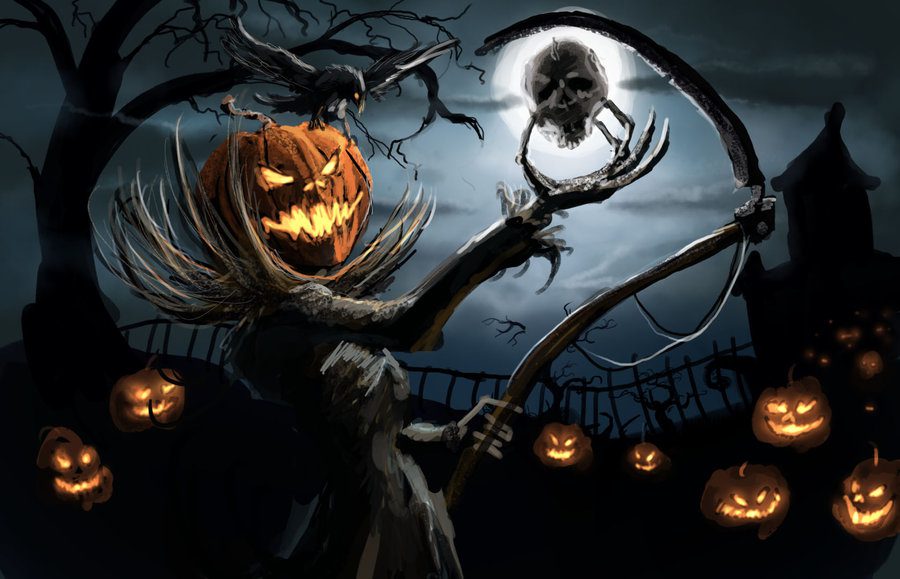The roots of Halloween can be traced back to the Celtic religion, which dominated Europe before the days of Christianity. The holiday that greatly influenced what we know as Halloween is Samhain, a celebration in which it was believed that the veil between our world and that of the spirits dissipated, allowing those who had passed to walk freely among us.
When Christianity made its waves across Europe, the celebration was put to a halt as the church labeled it pagan. This label stemmed from some beliefs recorded by those, including Julius Caesar, that the holiday involved the sacrifice of human beings, a fact that is somewhat divisive in the eyes of historians, according to Nicholas Rogers’ “Halloween: From Pagan Ritual to Party Night.”
However, a popular tactic used in hopes of converting those in Europe was to incorporate their religion into Christianity. An article by Jack Santino on the Library of Congress website explains that the origins of the Christmas tree were the result of an edict of Pope Gregory I.
“Rather than try to obliterate native peoples’ customs and beliefs, the pope instructed his missionaries to use them: if a group of people worshipped a tree, rather than cut it down, he advised them to consecrate it to Christ and allow its continued worship,” Santino writes in the article.
This practice is what resulted in All Saints’ Day, a minor Catholic holiday that was originally meant to commemorate the dead and, when first created, it focused on those martyred by pagan emperors, according to Rogers. Eventually, the holiday went on to focus on saints.
Several hundred years later, the holiday eventually began to focus on masses held in hopes of keeping the spirits who walked amongst the living away and to pray for those who were trapped in purgatory, or the space between heaven and hell.
All Saints’ Day is more familiar to those in Arizona as Dia de los Muertos, or Day of the Dead. The holiday is a derivative of All Saints’ Day, as it resulted from combining the celebrations of the Aztecs in Latin America and the Catholicism of the Spanish Conquistadors. The holiday falls on what is traditionally All Saints’ Day, Nov. 1, and is meant to celebrate the dead rather than mourn them.
The Aztec roots of this holiday go back to the Mesoamerican belief that the balance between those who died and those who lived was crucial, and festivals reflecting this belief were commonplace throughout Latin America, according to Regina Marchi’s “Day of the Dead in the USA: The Migration and Transformation of a Cultural Phenomenon”.
Marchi also explains that the fusion of the two beliefs resulted from the missionaries’ inability to stop the native people from celebrating their dead through shrines, the consumption of alcohol, dancing and other activities. As such, finding that the holiday was similar to All Saints’ Day, the act of cultural immersion that had resulted in the creation of All Saints’ Day was once again put into action.
According to Marchi, Dia de los Muertos was acknowledged by those in the Southwestern U.S. as early as the 1890s, but most Mexican-Americans did not celebrate the holiday until the 1970s due to lack of either knowledge or identification with the indigenous culture of Mexico.
Halloween was not seen in the U.S. until the 19th century, as All Saints’ Day had been banned by the Puritans who lived in the country who saw it as giving into the anti-Christ, according to Rogers. However, he goes on to add that the arrival of the Irish in the 1800s led to a drastic change, which saw the holiday be celebrated amongst the immigrants.
In regards to Halloween as we know it, most of the history can be traced back to the Samhain. Wearing costumes and going door to door saying “trick or treat” is a mirror of when food and beverage were left out in the Celtic period in order to appease the souls of the dead and the other various creatures wandering around, such as witches and demons.
So when going out this Halloween, simply remember that the holiday has roots that are significant to certain cultures and that in their eyes, the horror stories we hear about the dead amongst us may not be as fictional as we would like to believe.
Wriiten by Ariella Noth.


